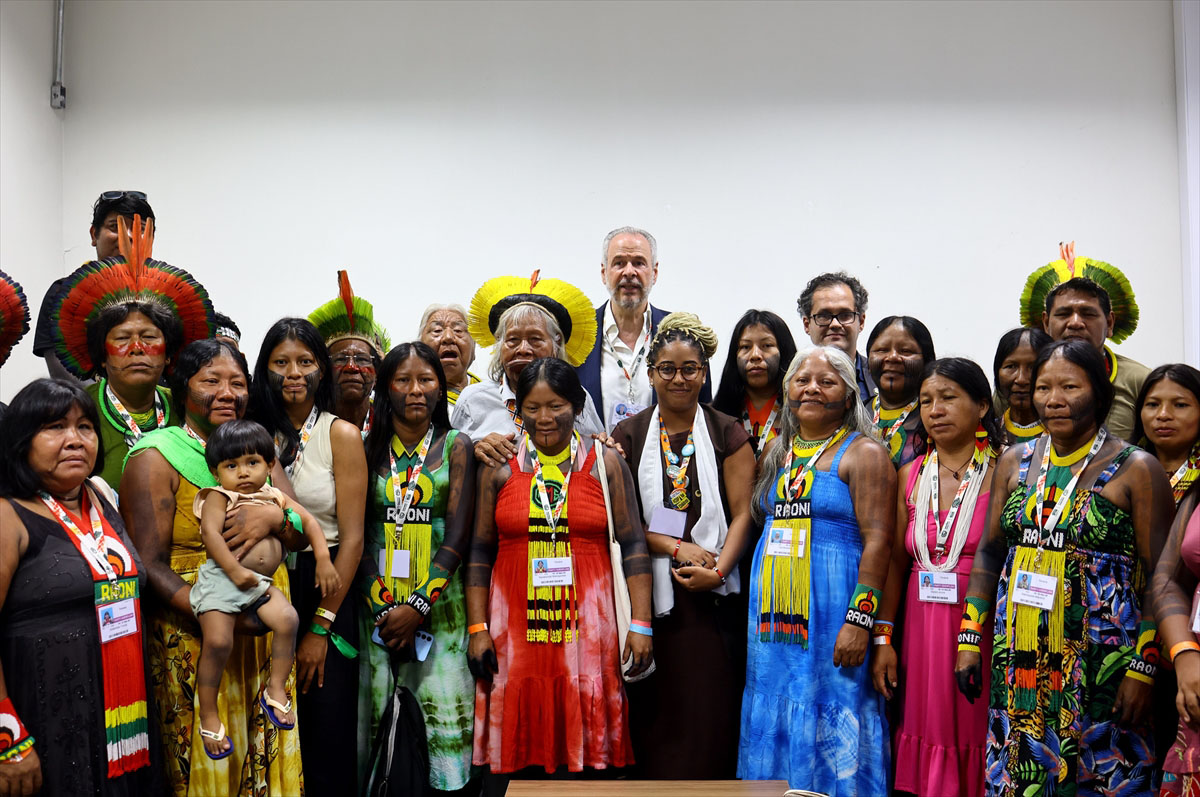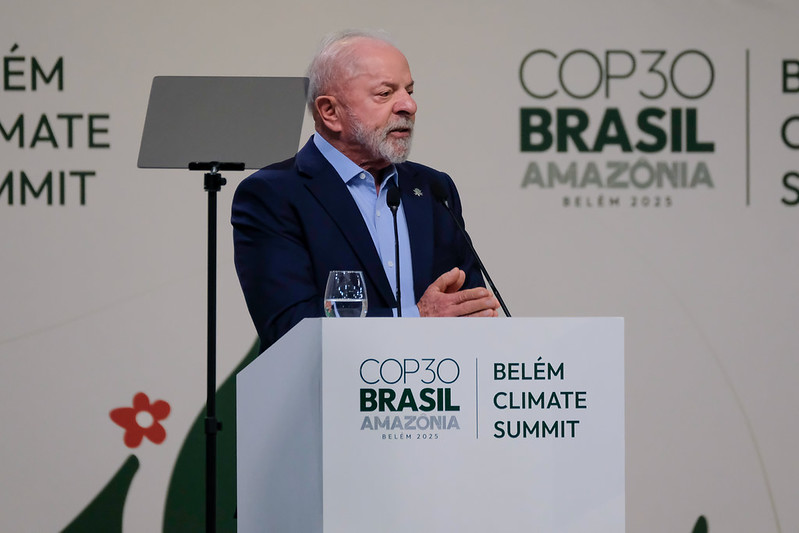
Sarah Sakeena Marshall
Fossil fuel interests won the day at the latest UN climate conference, COP30. Held in Belem, Brazil, a city known as “the gateway to the Amazon” between November 10-22, the conference’s proximity to the Amazon Rainforest and strong Indigenous presence was expected to positively influence negotiations by centering the voices of vulnerable local populations living within such a fragile and globally significant ecosystem.
However, the conference also drew attention for the disproportionate number of fossil fuel lobbyists present—1 in 25 attendees. Negotiations went over time as competing interests grappled over the language of the final text, which could not be signed without a consensus.
Significantly, few heads of major states attended the talks, though most sent delegations. At previous COPs, national leaders would usually make an appearance; their absence speaks to the dulling sentiment around climate multilateralism.
Prime Minister Keir Starmer, appeared for two days, signing onto a few initiatives, but notably refusing to contribute to the tropical forest fund. The U.S., one of the world’s top carbon emitters, sent no official delegation, though some state representatives attended.
President Donald Trump again withdrew the U.S. from the landmark Paris Climate Agreement and recently claimed that climate change is a “con job.”
At the summit’s opening, Brazil’s President, Lula da Silva, addressed delegations, warning, “We are moving in the right direction, but at the wrong speed. At the current pace, we are still heading toward a rise in global temperature of more than one and a half degrees.

Luiz Inácio Lula da Silva, President of Brazil, speaking during the Opening Plenary of the Belém Climate Summit. (Photo: UN Climate Change/Diego Herculano)
Crossing that threshold is a risk we cannot afford to take.” Despite the conference’s discussion of keeping global temperatures to 1.5°C below pre-industrial levels, scientists announced that that threshold was passed in 2024. Many now aim to keep warming levels below 2°C.
As the 2-week conference progressed, delegations signed onto various initiatives. The Belem Declaration on Global Green Industrialization received support from the UK, Australia, South Korea, Tuvalu, the UAE, and other governments, along with over 20 international organizations.
The initiative aims to accelerate decarbonization of heavy emitting industries and promote green industrialization, though the weak language in the document primarily focuses on “recognizing,” “sharing,” and “acknowledging” various truths about climate change and calling for cooperation.
The RAIZ (Resilient Agriculture Investment for Net-Zero Land Degradation) Project seeks to invest in sustainable agriculture such as regenerative farming to address soil degradation, and to tackle food insecurity. The UK, Saudi Arabia, Norway, Japan, and 6 other countries supported the initiative, led by Brazil.
Over the years, agriculture has led to significant deforestation in the Amazon, displacing communities and threatening biodiversity. Soil degradation is a global problem exacerbated by planting the same crops (monoculture).
Seasonal changes also make it harder for farmers to plan when to plant and harvest, leading to concerns about crop yields.
Climate denialism and misinformation took on an important role at the negotiations. During his opening speech, President Lula mentioned how climate misinformation was harming the perception of multilateral cooperation and climate action.
Brazil, along with the United Nations, spearheaded the adoption of the Global Declaration on Information Integrity, which aims to combat misinformation, particularly related to climate change.
The issue became especially relevant after a fire broke out at the conference and some netizens spread conspiracies blaming China for the blaze. The fire was quickly contained, and no major injuries were reported, though over a dozen people received treatment for smoke inhalation.
Multiple protests led by Indigenous groups took place at the conference, with demonstrators blocking entrances and disrupting negotiations to demand demarcation of Indigenous territories and an end to commercial development projects, as well as urgent climate action including an end to fossil fuels.
The Muslim News communicated with Tyapompo Arara, an Indigenous leader of the Arara women attending the conference, who stated, “Our forest is being heavily destroyed by farmers, loggers, and miners, and this is very worrying for us within our village.”

Indigenous members of civil society during COP30’s People’s Plenary. (Credit: Kiara Worth/UN Climate Change Flickr CC)
Bushe Matis, General Coordinator of UNIVAJA, a non-profit organisation representing the Indigenous Peoples of the Vale do Javari spoke with The Muslim News about COP30 and said, “Everyone is seeing that all Brazilian peoples and others are participating.
Whether they like it or not, our voice is being heard. Whether they will decide based on that is another question. We hope that the largest funders who want to support indigenous peoples and traditional communities will send resources directly to grassroots Indigenous organizations, that there will be more demarcation of territories, and that the government will respect Indigenous rights.”
At the conference, Brazil’s President recognized 10 new Indigenous territories, which will be protected under Brazilian law after he signs a presidential decree.
The Muslim News interviewed Elisabete Dumbia, a Program Analyst at the United Nations Development Program (UNDP) and part of the Guinea-Bissau delegation at COP30. Dumbia expressed, “My main goal is to strengthen partnership with donors, identify new financing, and to share lessons learned from our previous project, the coastal resilience project, that just closed this month.”
That project was a 6-year coastal resiliency project for $12M, funded by the Global Environment Facility (GEF) and UNDP, that replanted mangroves, rebuilt schools and roads, and supported women, ultimately benefitting around 80,000 people.
While national delegations wrangle over language on phasing out fossil fuels, local communities are mobilising resources to adapt to climate change and bolster their resilience.
Solutions negotiated by national delegations are ultimately implemented at the local level; green infrastructure projects happen within communities.
As Global South nations demand stronger climate action and more funding to protect their vulnerable communities, delegations from countries heavily reliant on fossil fuels sought weaker language for the final document—and the latter again prevailed.
Climate conferences bring together ambitious groups—the youth whose future hangs in the balance, leaders who fear debt and social unrest following a natural disaster, and lobbyists of all kinds.
The lofty goals and final outcome, which often fall short, may make headlines, but those participants who cut through the noise, those who are doing the work on the ground to implement real resilience and adaptation projects, they are the truly ambitious.
Feature photo: Indigenous icon Raoni participates in a meeting in the Blue Zone at the 30th UN Climate Conference in Belém, Brazil, on November 15. (Credit: COP30/AA)
Sarah Sakeena Marshall
Data Assistant